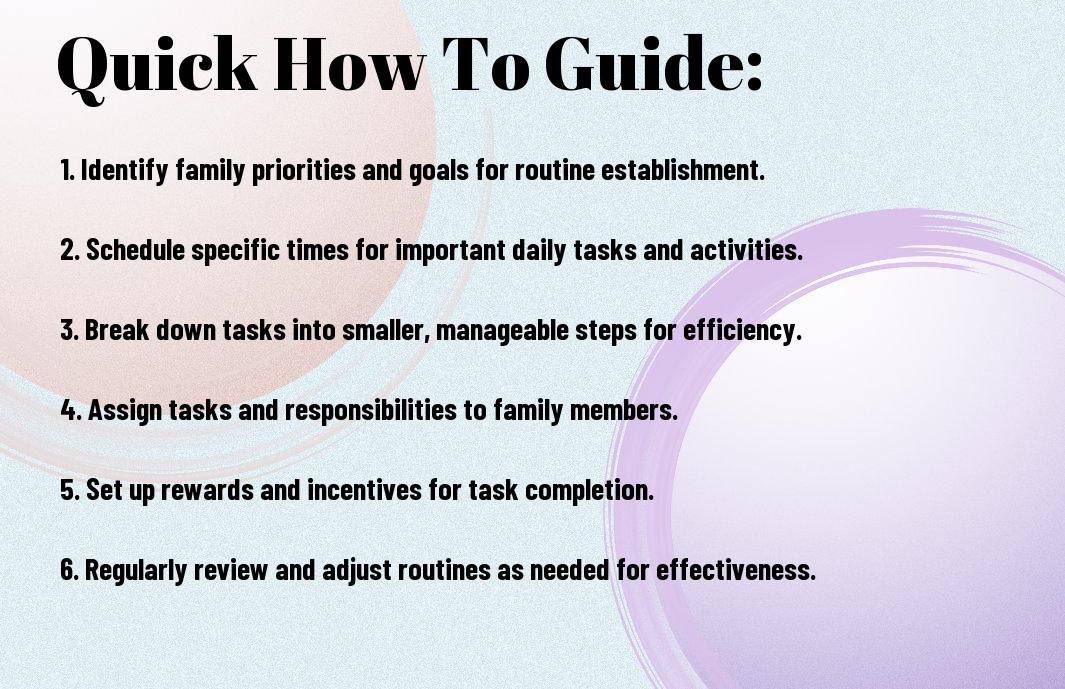Efficiency is key for busy families looking to create effective household routines. Managing a household can be overwhelming, but implementing small, consistent habits can make a significant difference. By incorporating the principles of Atomic Habits, families can build routines that are sustainable and bring order to daily chaos.
Key Takeaways:
- Start small: Break down big tasks into smaller, manageable steps to make it easier for busy families to incorporate new habits into their routine.
- Consistency is key: Establishing a consistent schedule or routine helps create a sense of stability and predictability for everyone in the household.
- Set clear expectations: Clearly communicate responsibilities and expectations to each family member to ensure that everyone is on the same page.
- Use visual cues: Visual reminders or cues can help prompt family members to remember tasks or routines, such as using a chore chart or shared calendar.
- Celebrate small wins: Acknowledge and celebrate achievements, no matter how small, to motivate and encourage family members to continue building new habits.
- Adapt and adjust: Be flexible and willing to make changes to routines as needed to accommodate the evolving needs of a busy family.
- Lead by example: Children often learn by observing their parents, so parents should model the habits and behaviors they want to instill in their family.

Understanding Atomic Habits
Even though the idea of creating good habits may seem daunting, understanding the concept of atomic habits can make it more manageable for busy families. Atomic habits are small, incremental changes that can lead to significant improvements over time. By breaking down larger goals into tiny, achievable habits, families can make lasting changes without feeling overwhelmed.
What Are Atomic Habits?
Any action you take, no matter how small, can have a compounding effect on your daily routines. By focusing on small, consistent changes in behavior, such as tidying up for 5 minutes each day or reading a bedtime story to your kids, you can gradually transform your household into a more organized and harmonious space. These tiny habits may seem insignificant on their own, but over time, they can add up to meaningful changes in your family’s lifestyle.
The Psychology Behind Habit Formation
You may be wondering how habits are formed and why some stick while others fade away. Psychology tells us that habits are deeply ingrained behaviors that have been reinforced over time. When you consistently link a particular cue (such as coming home from work) with a routine (such as cooking a family dinner) and reward yourself (enjoying the meal together), your brain forms a strong connection that makes that behavior more automatic. By understanding the psychology behind habit formation, you can intentionally design routines that are more likely to become lasting habits for your busy family.
Laying the Foundation for Success
All busy families can benefit from establishing effective household routines. By creating habits that work for your unique situation, you can streamline daily tasks and reduce stress. The key is to lay a solid foundation that supports your family’s priorities and goals.
Identifying Your Family’s Priorities
Priorities are the values and principles that guide your family’s decisions and actions. Take some time to discuss and determine what matters most to your family. Is spending quality time together a priority? Or perhaps maintaining a clean and organized home is necessary? By focusing on your priorities, you can align your routines with what truly matters to your family.
Setting Realistic and Achievable Goals
Foundation is crucial for successful habit formation. When setting goals for your household routines, it’s important to be realistic and achievable. Start by breaking down larger goals into smaller, manageable tasks. For example, if your goal is to have a tidy home, set a specific task for each day of the week, such as decluttering one room or tackling a load of laundry. This approach makes it easier to stay on track and build momentum over time.
Laying a strong foundation based on your family’s priorities and setting realistic goals will help you create effective household routines that work for everyone. Keep in mind, consistency is key, so be patient with yourselves as you establish new habits. Stay focused on your priorities, celebrate small wins along the way, and adjust your routines as needed to fit your family’s changing needs.

How-To Tips for Developing Effective Household Routines
Many families find it challenging to create and maintain effective household routines in the midst of busy schedules. However, with some strategic planning and consistency, it is possible to establish routines that work well for everyone involved. Here are some tips to help you develop effective household routines:
Starting with Small Changes
Effective household routines are built over time, starting with small changes that gradually become habits. Begin by identifying areas in your daily routine that could benefit from more structure. Maybe it’s establishing a regular mealtime, setting aside a specific time for homework, or creating a bedtime routine. Start by implementing one small change at a time and give your family time to adjust before adding more.
- Consistency is key in creating effective household routines. Establishing a regular schedule helps to set expectations and creates a sense of stability for everyone in the family.
- Make sure to communicate with your family members about the changes you are implementing and why they are important. Getting everyone on board will make it easier to stick to the new routines.
Assume that it may take some time for everyone to adapt to the new routines, so be patient with yourselves and each other as you work towards establishing habits that work for your family.
The Role of Consistency in Building Habits
Now, let’s talk about the importance of consistency when it comes to building habits within your household. Consistency is the key to making routines stick and ensuring that they become second nature to everyone in the family. When you consistently follow a routine, it becomes ingrained in your daily life and requires less effort over time.
The more consistent you are with your household routines, the more likely they are to become automatic behaviors. This can lead to a more organized, less chaotic household where everyone knows what to expect and can plan their days more effectively.
The consistency of your routines will help create a sense of security and predictability for your family, making it easier for everyone to navigate their daily tasks and responsibilities.
Factors That Influence Habit Formation in a Family Setting
Despite our best intentions, establishing effective household routines can sometimes be a challenge in a busy family setting. Understanding the factors that influence habit formation can help us create sustainable and successful routines that benefit the whole family.
The Impact of Individual Differences
Individual differences play a significant role in how habits are formed within a family. Each family member may have unique personality traits, preferences, and motivations that influence their ability to adopt new habits. For example, some may thrive on structure and routine, while others may prefer a more flexible approach. By acknowledging and respecting these differences, families can tailor their routines to accommodate the needs of each member, increasing the likelihood of success.
After all, habits that are aligned with individual preferences and motivations are more likely to be sustained over time, leading to a more harmonious and efficient household.
Creating a Supportive Environment at Home
Setting up a supportive environment at home is crucial for habit formation in a family setting. This includes creating physical and emotional spaces that promote positive behaviors and make it easier for family members to stick to their routines. Simple changes like organizing common areas, setting up reminders, and providing encouragement can go a long way in reinforcing desired habits.
Moreover, cultivating a sense of teamwork and collaboration within the family can create a supportive atmosphere where everyone feels valued and motivated to contribute towards building successful household routines.
More about Creating a Supportive Environment at Home
Habit formation can be greatly influenced by the environment in which it takes place. By designating specific areas for certain tasks and creating visual cues that prompt action, families can make it easier for everyone to follow through with their routines. Additionally, establishing clear communication channels and celebrating small wins together can help reinforce the desired habits and foster a sense of unity within the family.
Overcoming Common Challenges
Your busy family can still establish effective household routines by implementing the principles from Atomic Habits: An Easy & Proven Way to Build Good … by James Clear. To stay consistent and maintain progress, it’s important to address the common challenges that may arise.
Tips for Staying on Track When Life Gets Hectic
With the hustle and bustle of family life, it’s easy to get off track with your household routines. To combat this, create a visual schedule that everyone in the family can refer to. This will help keep everyone accountable and on the same page. Additionally, set reminders on your phone for key tasks or chores to ensure they don’t slip through the cracks. Recall, it’s okay to be flexible and adjust your routine as needed to accommodate unexpected changes. The key is to stay committed and make small adjustments to keep moving forward.
Adapting Routines to Fit Changing Family Dynamics
On occasion, family dynamics can shift, impacting the effectiveness of your established routines. Common changes such as a new baby, a child’s extracurricular activities, or a parent’s work schedule can all disrupt the flow of your household routines. It’s crucial to remain adaptable and willing to make adjustments. Remember that consistency is key, even if the routine needs to be tweaked to fit the current family dynamics. By communicating openly with your family members and reassessing your goals regularly, you can ensure that your household routines continue to serve your family well. The key is to embrace change and find a new balance that works for everyone. The flexibility to adapt and the determination to keep moving forward are imperative in overcoming these common challenges.
Integrating Atomic Habits into Various Aspects of Family Life
Managing Morning Madness with Routine
For busy families, mornings can often feel chaotic and stressful. Establishing a solid routine can make all the difference in starting the day off right. Family members can set out clothes the night before, prepare breakfast items ahead of time, and designate specific tasks for each person to streamline the morning routine. Small habits like waking up 15 minutes earlier or having a designated spot for keys and backpacks can have a big impact on reducing morning madness.
Streamlining Daily Chores and Responsibilities
Clearly defining roles and responsibilities within the family can help streamline daily chores and tasks. Assigning specific chores to each family member based on age and ability can create a sense of ownership and accountability. This not only ensures that tasks get done efficiently but also teaches valuable life skills. Enforcing consistent habits like tidying up before bed or doing laundry on designated days can help keep the household running smoothly.
Aspects like setting up a chore chart or implementing a reward system can further motivate family members to stay on top of their responsibilities. Consistency is key in building these habits, so it’s important to stick to the routine and adjust as needed to find what works best for your family. By integrating atomic habits into various aspects of family life, you can create a more organized and harmonious household.
Measuring Progress and Celebrating Successes
Noting the progress your family makes in developing new habits is crucial for maintaining motivation and momentum. Celebrating even the smallest victories can keep everyone inspired and engaged in the process of creating effective household routines.
How to Keep Track of Your Family’s Habit Development
The best way to keep track of your family’s habit development is by creating a habit tracker. You can use a simple chart or an app to monitor each family member’s progress. With a visual representation of how everyone is doing, it becomes easier to identify areas that may need more focus and recognition.
Rewarding the Family for Consistent Effort
Tracking your family’s habits is important, but so is rewarding them for their consistent effort. Set up a system where achieving certain milestones or sticking to routines for a period of time earns rewards. This could be anything from a family movie night to a weekend outing. Recognizing and celebrating these achievements will reinforce the positive habits you’re trying to instill in your household and encourage everyone to keep up the good work.
Keep in mind that the rewards should be meaningful and proportionate to the effort put in by each family member. It’s imperative to make sure that everyone feels recognized and appreciated for their contributions to the household routines.
Final Words
On the whole, creating effective household routines is imperative for busy families to thrive and stay organized. By implementing the principles of Atomic Habits, such as making small changes, stacking habits, and establishing a clear environment for success, families can build routines that work for them. Consistency and communication are key in ensuring that these routines are sustainable and beneficial for all members of the household.
Remember that creating effective household routines is a process that takes time and patience. Celebrate small wins along the way and be flexible enough to adjust as needed. With dedication and commitment, busy families can use the power of Atomic Habits to create a harmonious and efficient home environment that supports their well-being and productivity.
FAQ
Q: What are atomic habits?
A: Atomic habits are small, consistent changes that when practiced over time, can lead to significant improvements in various areas of life.
Q: How can busy families benefit from creating effective household routines?
A: Busy families can benefit from creating effective household routines by reducing stress, increasing productivity, and fostering a sense of stability and harmony in the home.
Q: Why are routines important for busy families?
A: Routines provide structure and predictability, which can help families manage their time more efficiently and create a sense of order in the midst of busyness.
Q: How can atomic habits be applied to household routines?
A: Atomic habits can be applied to household routines by breaking down large tasks into smaller, more manageable steps, and consistently practicing these steps to create lasting habits.
Q: What are some examples of atomic habits for busy families?
A: Examples of atomic habits for busy families include setting a specific time each day for meal preparation, creating a nightly routine for children before bedtime, and dedicating 15 minutes each evening to tidy up communal spaces.
Q: How can busy parents involve their children in creating household routines?
A: Busy parents can involve their children in creating household routines by assigning age-appropriate tasks, setting clear expectations, and offering praise and rewards for participation.
Q: What are some tips for maintaining consistency with household routines?
A: Some tips for maintaining consistency with household routines include setting realistic goals, prioritizing tasks, being flexible when necessary, and regularly reviewing and adjusting routines as needed.



